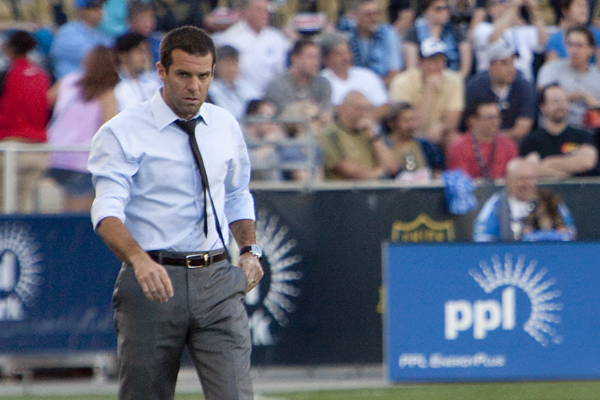Photo: Daniel Gajdamowicz
The aura surrounding Ben Olsen has ballooned since he coached the MLS All-Stars past Chelsea at PPL Park.
It’s an interesting phenomenon, considering the Pennsylvania native and FC Delco product justified it as a player on too few occasions for my taste as a fan of D.C. United and the U.S. national team.
As a player, Olsen competed with the same swagger against top internationals as he did against NCAA opponents, but the lofty presumptions about his potential never quite materialized. Olsen finished with a good but not great playing career.
As a coach, he may have more to say about U.S. soccer and his billing as an American prodigy than he ever could as a player.
A better future
United drafted Olsen with the understanding that he would eventually take the reins from Marco Etcheverry and perpetuate a series of titles without end.
Neither the generational handoff nor the series of titles played out as D.C. had hoped.
Olsen remained on course for two strong seasons but then failed to complete a full season for United over the following three. He didn’t hoist the MLS Cup again until 2004, courtesy primarily of Jaime Moreno, Christian Gomez, Ryan Nelson, and Peter Nowak.
At the national level, he scored some important goals and put in some noteworthy performances, but despite indisputable talent, he never made a consistent impact.
Still, Olsen’s flashes of brilliance, recognition as a leader, and unbridled exuberance always projected an image of him as a better future, even after a decade of terribly timed injuries resulted in more disappointment than goals.
U.S. soccer gave all it had…
Olsen’s retirement from playing might have signaled a defeat for the U.S. soccer prototype. The FC Delco Hall of Famer, Project 40 talent, Parade Player of the Year, NCAA Player of the Year, Bruce Arena-trained and Etcheverry-molded playmaker, MLS Rookie of the Year — i.e. one of his generation’s most accomplished U.S.-based players — had fallen short of his potential.
But from those ashes, Olsen immediately emerged to pursue another grand and possibly more complex role as coach of United. To succeed, Olsen would need to find more effective ways to tap his understanding of the game, dynamic attitude on the field, and the full value of training under Arena (best US coach ever) and Etcheverry (best MLS player ever).
…and it was enough!
Because injuries and physical issues do not affect coaching, his widely praised performance as All-Star and United coach turns on an intensely focused and complex understanding of players and the game.
Only the most academic proponent of the game would have argued MLS should have aimed to develop top strategic and tactical thinkers, circa 1996, as well as baseline professional talent.
Just two of the original 10 MLS coaches were Americans (Arena, Dir). Today, it’s a different story:
- Eleven of the 19 current MLS coaches are former MLS players, including five Americans (Olsen, Kreis, Heaps, Vermes, Marsch; also Pareja, Fraser, Yallop, Warzycha, Kinnear, Klopas).
- Another two played in the USL, including one American (Hackworth; also Wilkinson).
- Another one is an American drafted by an NASL team (Arena).
Just as American players have gained increasing respect for their performances abroad, these ex-player coaches — and Olsen very prominently — reflect the fact that the training behind the U.S. soccer prototype can engender a deep and effective understanding of the game.
Fairly or unfairly, Olsen has received the full investment of U.S. soccer and has borne the weight of national expectations. His appearance last week at PPL Park may have marked a reclamation of national ambitions, and it may signal the next generation of US soccer development. In the familiar position as a face of US soccer, Olsen seems an appropriate candidate to elevate our expectations and lead an increasingly numerous and savvy cadre of American coaches to a better future on international sidelines. Olsen’s swagger as a player may prove useful as he increasingly commands respect as a coach at higher levels. His playing career may be done, but he may still fully justify all those national expectations once put upon him.


His pre delco days are never discussed, but He was one cocky four letter word I his youth. Playing olmstead and Middletown high was always treat. Happy for him, he grew up being the best player on bad teams and wasn’t spoiled and spoonfed like the youth that play today on glorified select teams. Hopefully more coaches like him come up through the ranks